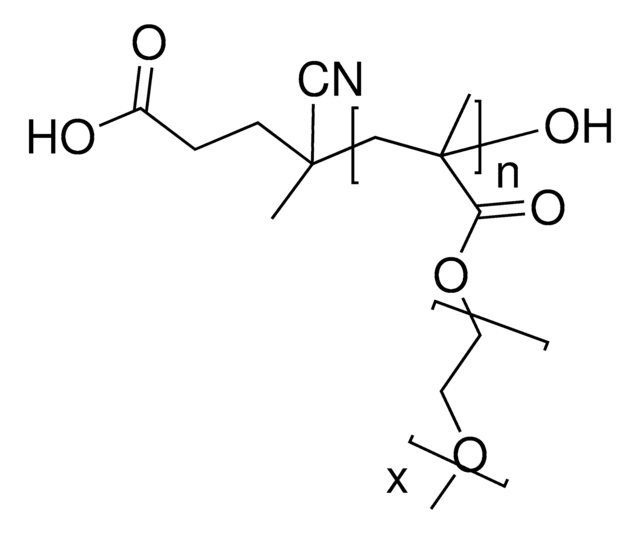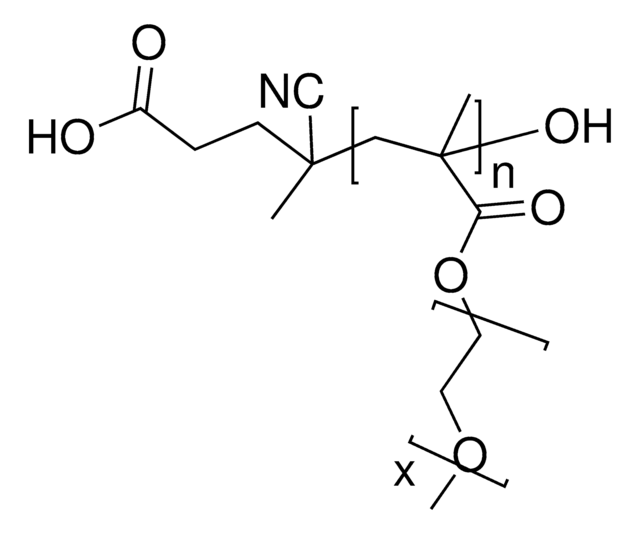추천 제품
양식
solution
분자량
~20,000 g/mol
색상
clear colorless to pale yellow
작용기
hydrazide
저장 온도
2-8°C
일반 설명
Poly(oligoethylene glycol methacrylate) (POEGMA), is a comb-shaped, graft copolymer consisting of hydrophilic oligomer PEG chains grafted to a hydrophobic polymethacrylate backbone. POEGMA has been suggested as a viable alternative to poly (ethylene glycol) (PEG) in biological and biomaterial applications. POEGMA has been reported to improve pharmacokinetic properties of protein and peptide conjugates, enhance the stability and gene silencing efficiency of siRNAs, as an anti-fouling surface for biosensors, and eliminate PEG antigenicity. In addition to use in biomolecule-polymer conjugates, PEOGMA has also seen wide spread use in tissue engineering applications, such as hydrogel synthesis. Hydrazide-functionalized POEGMA can be readily used with the corresponding aldehyde-functionalized POEGMA for rapid gelation via reversible hydrazone bond formation. Due to the reversibility of the bond formation and the low viscosity of the precursors, resulting hydrogels can be used as injectable tissue engineering matrices, local drug delivery vehicles for small molecules, or as joint lubricants. In addition, the physical properties of the resulting hydrogels, such as LCST, gelation rates, swelling kinetics, degradation kinetics, and mechanical properties, can all be readily controlled by solution concentration and the ratios of each solution.
제조 메모
This product is provided as a 25 wt% solution in water, ready to be diluted for your specific application. Please see the technical bulletin on the product page for dilution and hydrogel preparation instructions.
Storage Class Code
10 - Combustible liquids
WGK
WGK 3
Flash Point (°F)
Not applicable
Flash Point (°C)
Not applicable
가장 최신 버전 중 하나를 선택하세요:
이미 열람한 고객
Reactive electro spinning of degradable poly(oligoethylene glycol methacrylate)-based nanofibrous hydrogel networks.
Xu F, et al.
Chemical Communications (Cambridge, England), 52, 1451-1454 (2016)
A. brush-polymer/exendin-4 conjugate reduces blood glucose levels for up to five days and eliminates poly(ethylene glycol) antigenicity.
Qi Y, et al.
Nmr in Biomedicine, 1, 0002-0002 (2016)
A brush-polymer/exendin-4 conjugate reduces blood glucose levels for up to five days and eliminates poly(ethylene glycol) antigenicity.
Qi Y, et al.
Nature Biomedical Engineering, 1, 2-2 (2016)
Weiping Gao et al.
Proceedings of the National Academy of Sciences of the United States of America, 106(36), 15231-15236 (2009-08-27)
The challenge in the synthesis of protein-polymer conjugates for biological applications is to synthesize a stoichiometric (typically 1:1) conjugate of the protein with a monodisperse polymer, with good retention of protein activity, significantly improved pharmacokinetics and increased bioavailability, and hence
Imran Ozer et al.
Biomacromolecules, 18(9), 2699-2710 (2017-08-05)
PEGylation, covalent attachment of PEG to therapeutic biomolecules, in which suboptimal pharmacokinetic profiles limiting their therapeutic utility are of concern, is a widely applied technology. However, this technology has been challenged by reduced bioactivity of biomolecules upon PEGylation and immunogenicity
자사의 과학자팀은 생명 과학, 재료 과학, 화학 합성, 크로마토그래피, 분석 및 기타 많은 영역을 포함한 모든 과학 분야에 경험이 있습니다..
고객지원팀으로 연락바랍니다.






